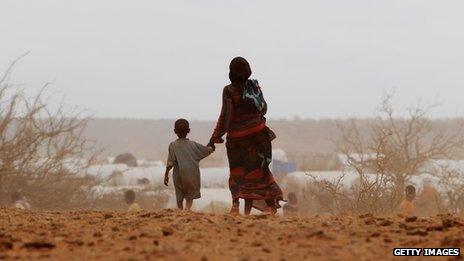Viewpoint: A time to stop giving?
- Published

At Christmas people are especially likely to respond to charity adverts featuring tragic images. But they should ask themselves why, says charity founder Georgie Fienberg.
If I say "the 1980s" what do you think of? The Rubik's cube? Maybe any number of astonishingly bad hairstyles?
Or perhaps the famine in Ethiopia comes to mind? Shocking images of starving masses in refugee camps, and shell-shocked British journalists relaying a desperate cry for help to the UK public.
It seems to me that although toys, music and fashion have changed, when it comes to international aid and charity, we are still stuck in the 1980s. I believe it is past time for the charity sector to provide, and the public to fund, a new form of charity - one that is respectful, engaged and creates independence.
In case you think that this is an obvious message, check the advertising in the paper or at the train station.
You are told £3 a month can save this child's life. Sponsor a mosquito net. Give a meal to this orphan. Lonesome faces will stare at you from the newspaper page or the billboard.
Guilt, shock and pity are the motivating impulses. But you have been donating to images like this since the 1980s. So why has nothing changed? And where did all the money go?
These big questions demand answers. If good money follows bad, nothing will change.
This type of fundraising is antiquated, delivers the wrong message and is actually a net negative for society at large - both for Western societies and those in developing countries.
I want to see poverty shock advertising consigned to the history books, right alongside the 80s perm. Only then can we start to engage in a dialogue that answers those big questions about the real efficacy of charity.
This is my personal opinion but it is an opinion borne from my experience over the last 14 years, founding and developing the international child rights charity AfriKids and consulting for a further 50 organisations both in the UK and Africa.
I'm going to do something unusual for a charity founder. Next time you see a pair of hungry eyes staring at you from the newspaper centrefold I'm going to suggest that you do not donate.
Instead I suggest you write to your favourite charity and ask them three simple questions:
When will the project they are fundraising for stop?
How will they know when it stops that it was successful?
How will they share the information on its success or failure with you, the donor?

Live Aid in 1985: But has charitable giving moved on?
Any good charity can answer these questions. Many can, but unfortunately, in my experience there are many more that can't.
My journey in international development began in my gap year in 1997. I saw first-hand the ineffectiveness of internationally-sourced aid in a deeply poor and afflicted society in rural northern Ghana, but I was also struck that there were so many highly motivated, well-intentioned and knowledgeable local individuals and organisations
From the start, I wanted to empower local people to make the changes they know they need themselves. No one is better placed to identify causes and deliver programmes to support than people who live and work in affected communities. Adopting a partnership approach combines external technical expertise and assistance with local know-how and delivery.
This experience of partnership working is what makes me so dismissive of the pity advertising of the newspaper and billboard.
Pity funds a blank cheque to the organisation. The money neither respects nor rewards the work and dedication of local people. It does nothing to fund the right sort of outcomes. It is unaccountable to you and unaccountable to the people it is supposed to benefit. And it can be easily squandered and the next day a new image can raise the same money and the cycle continues.
Charities should also get serious about sustainability. As a concept, it is uncontroversial - teach a man to fish, or better still build his own fishing rod and all that.
However, while many aid agencies are keen to promote their sustainability credentials, I am certain that the results of these good intentions are still significantly short of acceptable. And that is because in far too many instances, organisations preaching sustainable development are acting in ways fundamentally at odds with the concept, and the public are still far too susceptible to images and causes of immediate need.
For me, though, sustainability does not mean solving today's problems. It means ensuring that local people can solve their own problems independently of external assistance.
In practice, this means funding businesses. My charity chooses ones which meet social and economic objectives while also delivering a "multiplier" effect in the local economy. This effect will ultimately produce greater benefit than, for example, other more immediately profitable but limited enterprises.
The end result of this approach is that my charity is on track to be sustainable in the next five years. And with that, it will close in the UK in 2018.
If the wider development sector is ever going to achieve sustainability in practice, we are all going to need to take a radically different view to supporting more commercial-type enterprises, and contemplating the possibility of closure, than they do today.
Until both the industry approach and public perception of charity changes dramatically, I fear we will not unlock the key to effective development.
Both donor and charity have a role to play in this, but let's start simple - say no to pity fundraising - it belongs in the past. Today, the public and the people we seek to support, deserve more.
I used to say that you'd never see a billboard for my charity at the train station, until 2011 when we were donated the whole platform of billboards in Canary Wharf station in London. It was too good an opportunity to miss.
The slogans on our posters were "They can't depend on us", "Please help us walk away" and "Help us close down".
You can follow the Magazine on Twitter, external and on Facebook, external